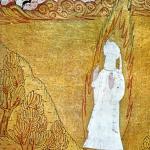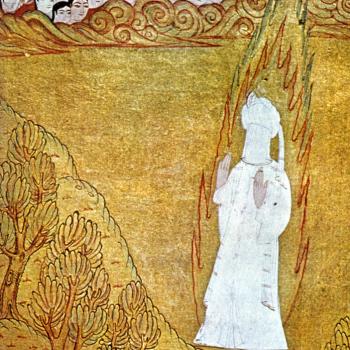
In Book III of the Masnavi, Mevlana tells the story of an eagle taking the shoe of Prophet Muhammad as he is finishing his ablutions before prayer.
That man of sweet address moved his hand towards the boot: an eagle snatched the boot from his hand,
And bore it away into the air, as the wind; then she turned it upside down, and a serpent dropped from it.
From the boot dropped a black serpent: on account of that care the eagle became his benevolent friend.
[Masnavi III, 3241–44]
At one level the story is about an alignment of perspective. The eagle, from her view in the sky, espies danger in a situation where the Prophet is too close to see it for himself. Once he realizes the eagle has saved him from being bitten by a snake, the Prophet thanks the bird. “I deemed this rudeness, but it really was kindness,” he says.
The eagle’s reply is a short teaching of its own on discernment:
“Far be it from you that forgetfulness grew up in you:
my seeing that invisible thing is your reflection.
I, in the air, see the serpent in the boot,
it is not of me, and it is your reflection, O Mustafa.”
The reflection of the man of light is wholly resplendent;
the reflection of the man of darkness is wholly a bath-stove ash-heap.
The reflection of the servant of God is wholly luminous;
the reflection of the stranger is wholly blindness.
Know every one’s reflection: see, O my soul;
ever sit beside the similar one whom you desire.
[Masnavi III, 3250–54]
Reflecting on this passage for myself, I could quickly identify the times in my life when things seemed to go wrong for a while (losing a relationship, losing a job, getting injured) only to find myself provided with better circumstances or more insight later on. Mevlana says the story is meant to be an illustration of the verse from Surah Ash-Sharh: With hardship comes ease. [94:5] This is a reminder of the Divine Mercy that is the context for all the events of our lives.
At the same time, I notice in myself a risk of falling into the punishment-reward narrative of conventional religion, if not replaying dysfunctional relationship dynamics: i.e., once I suffer enough then God will love me again and give me make-up presents.
Yet I think Mevlana is trying to point beyond this level of conditional relating and magical thinking. It’s about developing a higher state of spiritual awareness, where the obstacles and challenges that the ego normally tries to avoid, can be received as invitations to draw nearer to our Rabb. Mevlana says:
That tale is a lesson to you, O my soul, to the end that you may acquiesce in the decree of God;
So that you will be quick to understand and will have good thoughts when you see a calamity of a sudden.
Others turn pale from dread of it, you laughing in the hour of gain or loss, like the rose.
Because the rose, though you tear it petal by petal, does not leave off laughing and does not become bent.
“Why,” it says, “should I fall into grief on account of a thorn? Indeed I have brought laughter by means of the thorn.”
Whatever by destiny becomes lost to you, know for sure that it has redeemed you from affliction.
“What is Sufism?” He said, “To feel joy in the heart at the coming of sorrow.”
[Masnavi III, 3255–61]
In this part of the passage, I hear a call for another level of realignment, not just of accepting trials or acknowledging a bigger picture in one’s losses, but of being emancipated from the world of gain and loss entirely. Contentment with God’s decree is cultivating gratitude for what is. In Mevlana’s metaphor of the rose being stripped of its petals, it goes even further: there is a sense of ecstasy at being liberated from the veils of form and delivered into essence. To be in a state of surrender at the level Mevlana describes would mean welcoming every opportunity to shed another layer of the false self that keeps us apart from the Beloved.
That is how I understand “What is Sufism? To feel joy in the heart at the coming of sorrow.” It’s not about feeling that you deserve punishment but rather that you deserve to know you are inalienably, fully and permanently connected to Source. Gain and loss are only waves on the surface of that Sea. Joy arises with the knowledge that even the most painful circumstances can be gifts when we bring our need to the One who has no need: when we call out to our Sustainer, and hear Here I am.













